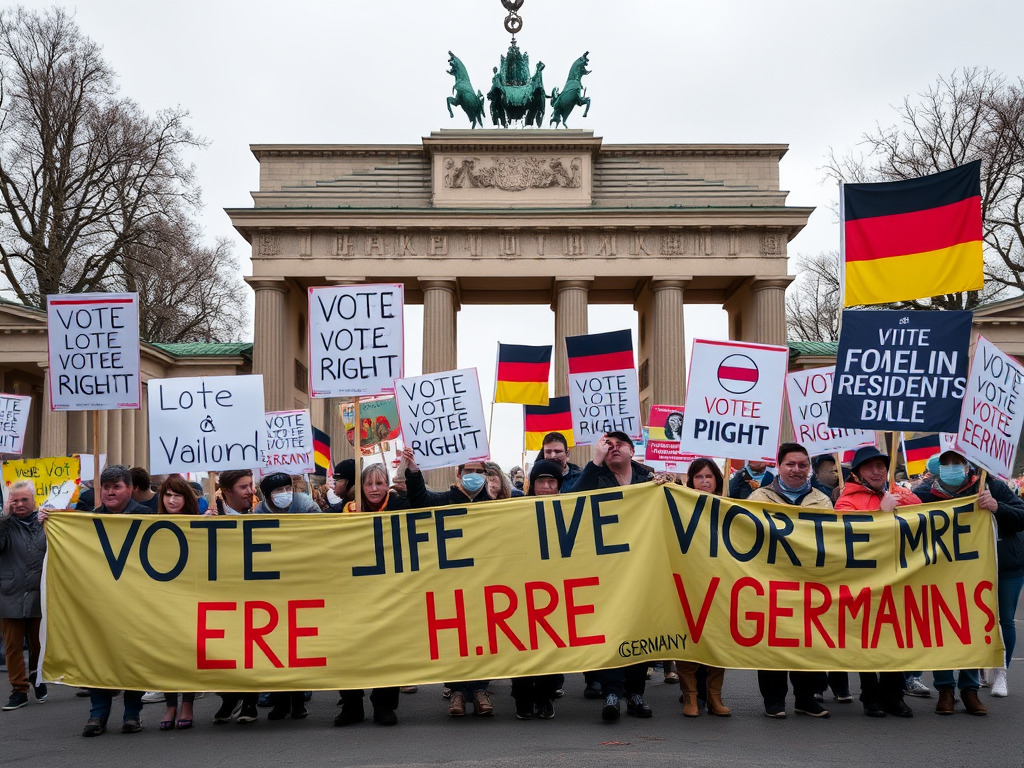INTRODUCTION
- People often acclaim Germany as a bastion of democracy. Yet, scrutiny increases ahead of its forthcoming elections.
- By January 2025, authorities did not permit about 10 million Germans to vote.
- This demographic includes permanent residents, refugees, and other residents without German citizenship.
- These individuals actively participate in the labor force and contribute significantly to the economy.
- Social systems also owe them a debt.
- Despite their contributions, they lack the political power to shape decisions impacting their lives.
- This exclusion has revived old debates about voting rights for long-term foreign residents in Germany and broader topics concerning democratic participation across Europe.
- Elections are drawing near, and stakeholders passionately debate whether non-citizens should receive voting rights.
- This article provides insight into the issue’s current consequences, discusses its historical and social context, and analyzes its significance for Germany’s political future.
Latest Developments
Growing Disenfranchisement Ahead of Elections
- Destatis (the Federal Statistical Office) gathered data showing that 10 million German residents—approximately 12% of the population—cannot vote in the upcoming federal elections because they lack German citizenship.
- This data underscores Germany’s heavy reliance on its immigrant workforce.
- Many of these individuals, who pay taxes and actively contribute to society, have expressed frustration with Germany’s restrictive voting laws.
- In an interview with Deutsche Welle, long-term resident and Turkish national Mustafa Aslan, who has lived in Germany for over 15 years, voiced his concerns:
- “I’ve spent my adult life working here, building a family, and paying taxes, yet I have no say in the policies that directly affect me. It’s not fair.”
Political Divide on the Issue
- German politicians remain divided on whether to extend voting rights to non-citizens.
- Progressive parties such as the Greens and the SPD have pushed for granting voting rights to long-term foreign residents, at least in local and regional elections.
- Proponents argue that this would strengthen democratic inclusion and reflect Germany’s values as a diverse, modern nation.
- However, opposition parties, like the AfD and parts of the CDU, maintain that only citizens should have voting rights.
- They argue that such changes would undermine national sovereignty and create integration challenges.
- A CDU spokesman stated, “Voting is a right reserved for citizens who have a formal stake in Germany’s governmental framework. Citizenship remains the proper avenue to political participation.”
Civil Society Advocates for Change
- Amid this debate, civil society organizations have gained traction in their activism.
- The Alliance for Voting Inclusion, a coalition of NGOs and citizen advocacy groups, has staged protests demanding the enfranchisement of foreign residents.
- Their argument is simple: democracy should include everyone affected by it.
- As spokesperson Clara Meier explained, “Denying voting rights to millions contradicts the principles of democracy. We are leaving behind a significant part of our population.”

Background and Context
Voting Laws in Germany
- German law directly ties voting rights to citizenship, a principle historically linked to the country’s jus sanguinis (right of blood) laws.
- While immigration and naturalization laws have eased over the past two decades, obtaining German citizenship remains a lengthy and complex process, requiring eight years of residency in most cases.
- Unlike Denmark and Sweden, other European democracies where long-term foreign residents can participate in local elections, Germany has largely resisted such reforms.
- This hesitance reflects broader tensions surrounding integration, nationalism, and cultural identity in German politics.
Historical Exclusions
- German law directly ties voting rights to citizenship, a principle historically linked to the country’s jus sanguinis (right of blood) laws.
- While immigration and naturalization laws have eased over the past two decades, obtaining German citizenship remains a lengthy and complex process, requiring eight years of residency in most cases.
- Unlike Denmark and Sweden, other European democracies where long-term foreign residents can participate in local elections, Germany has largely resisted such reforms.
- This hesitance reflects broader tensions surrounding integration, nationalism, and cultural identity in German politics.
Historical Exclusions
This exclusionary dynamic is not new. Large waves of foreign workers (commonly referred to as “Gastarbeiter” or guest workers), particularly Turkish workers in the 1960s and 1970s, faced similar challenges. Despite their long-term presence in Germany and valuable contributions to its post-war economic recovery, German society excluded many from political participation. Increased immigration causes today’s disenfranchisement to mirror these historical patterns, but on a much larger scale.
International Comparisons
- From an international perspective, Germany’s restrictive approach to non-citizen voting rights contrasts sharply with the approach of countries like Belgium, where officials allow foreign residents who meet specific criteria to vote in municipal elections.
- These comparisons have caused critics to question whether Germany risks falling behind its European counterparts in inclusivity and democratic modernization.
- Dr. Ulrich Becker, a political scientist from the University of Heidelberg, notes that Germany prides itself on its democratic principles, but its exclusion of non-citizen residents is striking when compared to other European democracies.
- He considers reform long overdue in this area.

Comprehensive FAQ
1. Who are the 10 million people excluded from Germany’s vote?
The excluded group primarily consists of long-term foreign residents, refugees, migrant workers, and individuals with permanent residency status who lack German citizenship. These people pay taxes, contribute to the economy, and participate in social life, yet they are barred from voting due to Germany’s citizenship-based voting system.
2. Why doesn’t Germany allow non-citizens to vote?
German voting laws are deeply tied to citizenship, reflecting its historical emphasis on national identity and integration processes. Politicians who oppose extending voting rights to non-citizens argue that voting should remain a privilege linked to full citizenship and that such a principle preserves sovereignty.
3. How does Germany’s policy compare to other European countries?
Germany’s laws are stricter compared to many European nations. For example, countries like Denmark and Sweden allow foreign residents to vote in municipal elections once they’ve lived in the country for several years. Germany’s resistance to this practice has drawn criticism for its lack of inclusion.
4. What impact does this exclusion have on German society?
This disenfranchisement creates a democratic deficit, as millions of residents lack political representation despite their financial, social, and cultural contributions. Critics argue that this exclusion erodes trust in institutions and integration efforts. Moreover, protests and growing advocacy reflect an increasing demand for voting reform.
5. Will voting laws in Germany change?
While changes to voting laws remain politically contentious, there is growing support—especially from progressive parties and civil society organizations—toward reform. Incremental changes, such as granting non-citizens voting rights at the local level, are seen as the most likely starting point for progress.
CONCLUSION
The exclusion of 10 million people from voting in Germany highlights a critical gap in its democratic framework. While the debate about expanding voting rights remains polarizing, the issue demands serious attention if Germany wishes to uphold its democratic values and accommodate its increasingly diverse society. With elections on the horizon, demands for reform grow louder.



